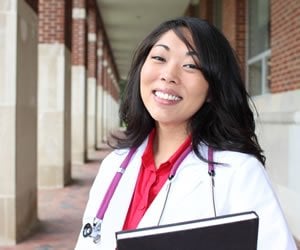
Expectations: Defining What You Can Expect With Your Spouse
Updated September 6, 2021. The article was updated to correct minor grammatical errors. Expectations. The ... Read more
Written by: Amy Rakowczyk
Published on: September 1, 2016

Updated September 6, 2021. The article was updated to correct minor grammatical errors. Expectations. The ... Read more
Written by: Amy Rakowczyk
Published on: September 1, 2016

A friend of mine studied film in college and subsequently found himself working as a ... Read more
Written by: Ryan Hickey
Published on: August 31, 2016

Central to the skillset of every physician is the differential diagnosis; this is the process ... Read more
Written by: Brent Schnipke
Published on: August 29, 2016

Reposted from here with permission The day Mr. Webster appeared on our service, I was late for ... Read more
Written by: Katelee Mueller
Published on: August 24, 2016

Brian Baxter, PhD, is a current postdoctoral scholar with the DeRisi Group at University of ... Read more
Written by: Juliet Farmer
Published on: August 22, 2016

The path to becoming a doctor can feel daunting. For those of us that don’t ... Read more
Written by: Megan Riddle
Published on: August 17, 2016

Welcome back! I’m so excited to start my second year (and write about it, of ... Read more
Written by: Adelle
Published on: August 15, 2016

One of the most important phases of the application process is your interview. It’s your ... Read more
Written by: AAMC Staff
Published on: August 11, 2016

This two-part series will discuss two types of post-baccalaureate pre-medical programs. This piece will address ... Read more
Written by: Cassie Kosarek
Published on: August 10, 2016

Tell me about yourself – who you are, what you do, where you practice. I ... Read more
Written by: Brent Schnipke
Published on: August 8, 2016

By Amy Rakowczyk, SDN Staff Writer When my husband and I arrived in our new ... Read more
Written by: Amy Rakowczyk
Published on: August 4, 2016

Poker, one may reasonably argue, is a game of sheer luck; he (or she) who ... Read more
Written by: Suhil Aggarwal
Published on: August 2, 2016

Physician burnout is a widely discussed topic among practicing physicians and public health researchers. Many ... Read more
Written by: Aaron Hamlin
Published on: August 1, 2016

Reposted from here with permission. “Of all the forms of inequality, injustice in health care ... Read more
Written by: Suhas Gondi
Published on: July 27, 2016

Central to the skillset of every physician is the differential diagnosis; this is the process by which ... Read more
Written by: Brent Schnipke
Published on: July 25, 2016

Central to the skillset of every physician is the differential diagnosis. This is a list of ... Read more
Written by: Brent Schnipke
Published on: July 19, 2016

Here’s a scenario I am asked about a lot: It’s a month before Step 1 ... Read more
Written by: Jason Ryan
Published on: July 18, 2016

As with any high stakes exam, it’s not surprising that there are a number of ... Read more
Written by: AAMC Staff
Published on: July 14, 2016

Applying to medical school is a humbling experience, even if you have a successful application ... Read more
Written by: Cassie Kosarek
Published on: July 13, 2016